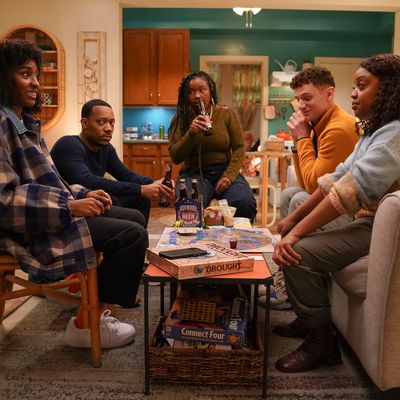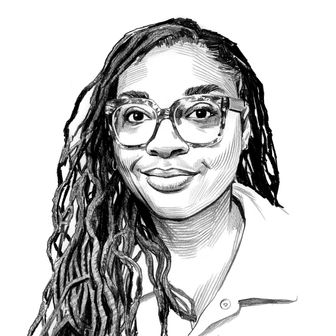
Siblings bring out a special version of us, pulling us back to our childhood and the foundation of our entire lives. The easiest way to activate your inner child is to spend quality time with the blood you grew up with. Maybe it’s because I have two older sisters, but I believe sisters, in particular, have a way of immediately bringing out the childhood self. I often joke that I could win a Pulitzer Prize and solve world hunger, but I’ll always be the baby sister.
When Janine’s older sister, Ayesha, visits, we see two grown women morph back into their childhood selves as some deep-seated resentments rise to the surface. Ecstatic about the opportunity to bond with her sister, Janine meticulously plans events for the weekend and is crushed when Ayesha says she’s made plans elsewhere on her first night in the city. This immediately triggers Janine’s feelings of abandonment as a child, bringing her back to the toxic dynamic she had with her mom and sister growing up. So Janine copes how she usually does — she shoves these feelings down and focuses on making everything as positive and perfect as possible.
Since she lost her first night with Ayesha, Janine puts all her energy into making the following day’s game night a success. She invites Gregory, Jacob, and her friend Erika to join the festivities. They play Drought, a game obviously brought by Jacob, that involves water rationing in a world ravaged by climate change. During the game, Ayesha makes a move where she abandons the land she’s on, leaving Janine to provide water for all of Asia. She defends this play by saying, “The point of this game is to survive, and you can’t do that if you’re taking care of everybody else.” For obvious reasons, this really triggers Janine, who feels like Ayesha left her out to dry (LOL) when she moved to Denver, leaving her home alone with their absentee mother.
Drought becomes a metaphor for their relationship. Janine says it doesn’t surprise her that Ayesha just “took her water and bounced,” forcing Janine to ration the rest when things got tough. Ayesha says she didn’t choose to start “in an arid, doomed biome,” but Janine interjects, saying that other people accepted the responsibility of “making due in a dry climate.” Eventually, the metaphor and board game are no longer the subject of the conversation, and the sisters continue the fight outside. The camera work here complements the moment wonderfully: The two speak to each other from a distance with a large pillar between them, the camera coming in close when one of the sisters is speaking their piece, focusing on only one of their faces at a time, emphasizing their drastically different points of view.
Their conversation is a regurgitation of their estranged history, with each of their past grievances spilling out. Here, you can see the little girl in both Ayesha and Janine calling out to be seen. We get to see Ayesha’s perspective, too — she tells Janine how what she saw as “abandonment” was really Ayesha leaving to care for herself after feeling like a failure. She explains how Janine’s overachievement created a dynamic where she felt hopeless, while Janine received attention and support. Janine was the one who had it together, and she was the one who couldn’t get it together when their mom needed them the most. It’s deep, like most big arguments between sisters are, but it leads to necessary revelations.
Their conversation shows how sometimes we make up narratives based on our own feelings without considering what it’s like to walk in someone else’s shoes. It reminds me of times when I would recall a childhood memory and hear one of my siblings remember it entirely differently. Even if the memory was innocuous and not a huge defining moment of my childhood, hearing their side of things gives me more insight into how they became the person that they are. And when it is something big, like in Janine and Ayesha’s case, it brings us closer together when we meet in the middle.
Ayesha visits Janine’s classroom the next day, taking in the decorations that she states are very “Janine … in a good way.” It’s sweet seeing her look around her sister’s world. She eventually asks if their mom has ever visited. This leads to a laugh between the sisters, who both know their mom has never stepped foot in Janine’s job. If anything can bring sisters closer together, it’s most definitely discussing the annoying things their mom does. After getting things out on game night, they come back together and finally bond in the way Janine always wanted.
The rest of the teachers also return to their basic instincts when they have to duke it out for two courtside tickets to a Philadelphia 76ers game the district provides for Teachers Appreciation Week. Things get tense as they devise a way to decide who gets the tickets. They settle on a vote and fight about who deserves to go. Jacob and Mr. Morton argue that as teachers of older students, they have to “endure the quick-witted teens.” Melissa believes she’s entitled to them because she’s teaching two classes at once, and Barbara believes they should go to the most tenured teacher (i.e., herself). Things get heated as they go back and forth about who is more deserving, culminating in Barbara telling Melissa that maybe if her kindergarten teacher had done a better job, she “would know that ‘youse’ is not plural for ‘you,’” which are basically fighting words. To Ava’s disappointment, no one swung on each other or “got molly whopped,” but in a surprising turn of events, Mr. Johnson wins the tickets. The teachers were so irritated from the fighting that the majority refused to vote for each other, voting for Mr. Johnson instead … who brings his podiatrist as his plus one.
Giving the school only two tickets is very on-brand with how our government treats teachers. Throwing below the bare minimum amount of resources and support and expecting the teachers to make due is unfortunately the standard. The teachers at Abbott reminisce on how they’ve always been good at sharing the little they’re given, like how they managed to share the one projector they received after being promised one for each classroom, remembering that they work better as a team than fighting with one another. It’s a shame that the abundance of appreciation comes from the students (and their parents), who take the time to shower their teachers with cards, plants, and hand lotion. It goes back to the teachers’ argument earlier in the episode — each is instrumental in helping craft these little humans into valuable people to society. As Barbara says at the end, she’s not in it for the paycheck or the “perks” from the people who sign it, but “the people who show up here every blessed day, dedicated teachers and the wonderful students.”
Teacher’s Notes
• One of my favorite Abbott tropes is when we stumble upon something Gregory actually likes. In this episode, we learn he loves board games, which kind of makes sense that his favorite genre of game would be the ones with clear rules and regulations.
• Erika is such a fun friend and character. The way she started asking Gregory about the conference is exactly what I would do in her shoes, because it’s important to know the tea!
• I cackled at the footage of Mr. Johnson wearing Gregory’s new hat while winning $1,000 AND a $50 gift card to Buffalo Wild Wings at the game after being asked to name ten cleaning products in 30 seconds. Barbara’s face was priceless.
• It’s great when some of Abbott’s other teachers get into the mix. Mr. Morton is always funny with his beef with Jacob, but I’m looking forward to more of the health teacher, Mrs. Pinkney, and her tales on how she keeps the students “off the pipe.”
• It seems like the time is upon us already — at the end of the episode Ava receives a letter from the district officially stating the petition plans to turn Abbott Elementary into a Legendary Charter School sooner rather than later. Nooooo.
And here are my favorite lines from the episode:
• Ava, on Gregory’s new hat: “Did you just finish Bling Ringing Bruno Mars’s closet?”
• Jacob, guessing what BYOBG means: “Bring your own … Black Gregory?”
• Mr. Johnson: “That’s why Mother’s Day was invented, so less moms would leave their families.”
• Ava, when meeting Ayesha: “Damn, she looks like the grown-up version of you. Like if your proportions were stretched out to a normal length.”
• Melissa: “Nothing good has ever come from nerds whispering.”
• Mrs. Pinkney: “I don’t know what y’all are smoking, but if you was to take my health class, you wouldn’t be smoking anything. I’d have you drug-, tobacco-, and vape-free like all of our students.”


